PAGE 9
OLD FASHION MADE NEW PAGE 11
SHAKE UP THESE MOCKTAILS PAGE 23
LET SOMEONE ELSE COOK PAGE 25
WE RE STILL HERE
Columbia families seek the stability of home and community in an unequal system. PAGE 12






PAGE 9
OLD FASHION MADE NEW PAGE 11
SHAKE UP THESE MOCKTAILS PAGE 23
LET SOMEONE ELSE COOK PAGE 25
Columbia families seek the stability of home and community in an unequal system. PAGE 12





Growing up, my family moved a lot. With every new town, every new school, I quickly learned to adapt and fit in; to find new friends and interests. When I was 13, we settled back in Armenia, my home country, and I had the privilege of finding my true colors — no more shifting like a chameleon. I learned what I love doing and where my values lie without having to worry if I could find people to connect with.
Last August, I moved again; to the U.S. this time. Turns out, moving as an adult is different. Often, I chose friends based on who they were as people and then fell into their hobbies. Soon I couldn’t answer a simple question of “What music do you like?” or “What do you do in your free time?” The answers depended on who I was with. I was 13 again, trying to find my true self and identity in a new country. I compromised to fit in. In search of a new community, I lost parts of my identity.
Many people in our stories this month face similar and other challenges brought by a lack of stability. Homeownership and constant moving gave a head start in life or created additional barriers to the families in our feature package (p. 12). A fashion artist moved across the country and managed to build a community around her (p. 11). Women veterans know first-hand the price of moving and transition to civil life and education (p. 9). Adapting stories are everywhere; it’s part of life.

As I’m making baby steps in rediscovering myself, this town weaves into my DNA. I’m grateful for the friends and the community I found — a safety net to redefine myself and follow my interests. With time, I put down roots. My friends and family wonder what I am going to do with all the books and furniture I bought, next time I move again. “I don’t want to hear it,” I reply. Columbia is my home for now, and I’m going to treat it as such.
KRISTINA ABOVYAN
DIGITAL MANAGING EDITOR MAE BRUCE
ART DIRECTOR CAMPBELL BIEMILLER
ASSOCIATE EDITORS
CULTURE JESSE BERLIN, LAUREN BLUE, LAUREN HUBBARD, EMMA LINGO, AMILEE NUZZO, KEARA SHANNON, MAX SHAPIRO
EAT + DRINK CHLOE KONRAD, NIA MARTIN, MELANIE OLIVA, PETRA RIVERA, ANNASOFIA SCHEVE, TAYLOR WILMORE
CITY LIFE ADAM ALLSBURY, CORINNE BAUM, ASHLEY BUTLER, SOPHIA DONIS, ABBY STETINA, TRINIDY THOMPSON, KAITLYN ZOGLMANN JENKINS
STAFF WRITERS MARA DUMITRU, TATEN JANES, SOPHIA KOCH, CHARLIE RECCHIA, KHALIA SMITH, JANE STEINBRECHER, SAM WILLS, CAYLI YANAGIDA
SOCIAL & AUDIENCE EMILY ELLER, AINSLEY LOWTHER, ANNIE SANFILIPPO, IRELAND SHELTON, MEREDITH WENDLING, SHANNON WORLEY
DESIGNERS SIREEN ABAYAZID, LIN CHOI, ASPEN GENGENBACHER, AVA HORTON, JACEY JOHNSON, MEGAN SYDOW
CONTRIBUTING WRITERS ANGELINA EDWARDS, EILEEN LI, OLIVIA MAILLET, MAGGIE TROVATO, NICOLE VOSS, AUSTIN WOODS
EDITORIAL ASSISTANT TYANA JACKSON
EDITORIAL DIRECTOR HEATHER ISHERWOOD
EXECUTIVE EDITOR LAURA HECK
SENIOR EDITORS CARY LITTLEJOHN, JENNIFER ROWE
Kristina Abovyan Editor-in-Chief
You Are Here is a project examining how America’s lopsided wealth distribution molds the lives and opportunities available to Columbia residents. As part of a semester-long capstone journalism class, our team of eight reporters dug into different facets of wealth inequality. We spent months researching and interviewing local residents and experts to understand tax policy, homeownership, the nuances of the wealth gap and more. Vox published two of the stories and an excerpt from one in our July/August feature package (p. 12). Find the rest of the stories and multimedia elements at columbiamissourian. com/youarehere.
—Mae BruceOFFICE MANAGER KIM TOWNLAIN
Vox Magazine @VoxMag
@VoxMagazine @VoxMagazine
WANT TO BE IN-THE-KNOW?
Sign up to receive Vox ’s weekly newsletter, the “Vox Insider.” We’ll tell you how to fill up your weekend social calendar and keep ahead of the trends. Sign up at voxmagazine.com.

CALENDAR send to vox@missouri.edu or submit via online form at voxmagazine.com
ADVERTISING 882-5714 | CIRCULATION 882-5700 | EDITORIAL 884-6432
JULY/AUGUST 2023

VOLUME 25, ISSUE 6
PUBLISHED BY THE COLUMBIA MISSOURIAN

LEE HILLS HALL, COLUMBIA MO 65211
Cover design by Campbell Biemiller with photography by Lin Choi
27

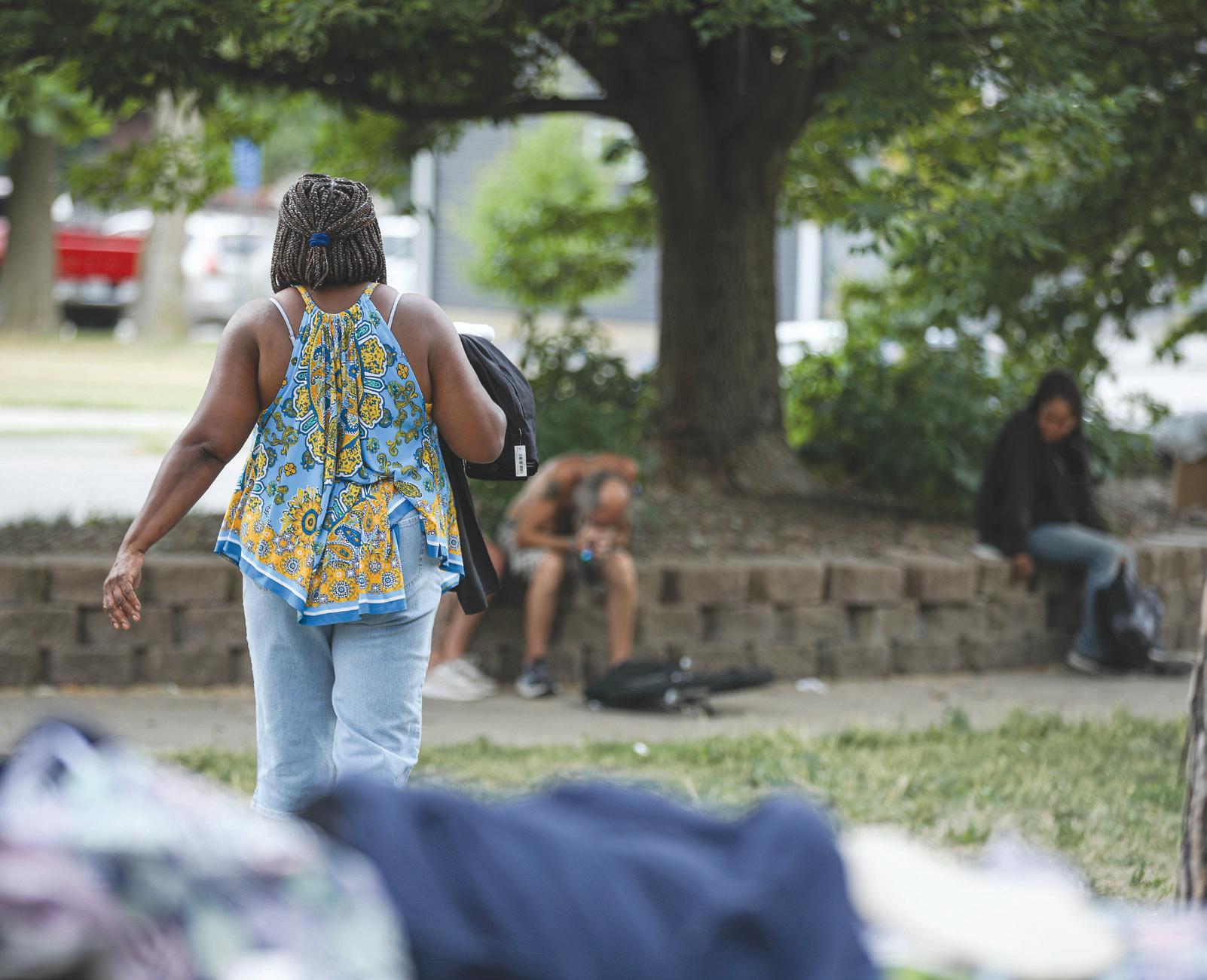




Children’s Grove raises awareness of children’s mental health through clubs and art focused on kindness.
BY CHARLIE RECCHIA

After the 2012 Sandy Hook Elementary School shooting, members of the Columbia community wanted to show their support in commemorating the 26 students and staff members who lost their lives. Anne Deaton and Suzanne McDavid organized funding and volunteers to plant a grove of magnolia trees in the northeast corner of Stephens Lake Park. These aren’t just any magnolia trees; they are butterflies magnolias — the butterfly serves as a symbol of kindness.
This act of kindness would eventually light a spark that would lead to the initiative known as Children’s Grove. The volunteer-based organization’s main goal is to raise awareness about children’s mental health by spreading kindness around Columbia and Boone County. “Multiple times a day, we have the choice to either do something kind, to do nothing or to do something unkind,” president Kim Dude-Lammy says. “We want people to do kind things, whether it is opening the door for somebody, complementing a stranger — there are so many opportunities to do something kind.

One main aspect of Children’s Grove’s reach and impact involves collaborating with Boone County educators. The organization helps fund Kindness Clubs in elementary and middle schools and

Youth Kindness Ambassador programs in high schools through donations of supplies, gift certificates and member T-shirts. About 800 students participate in these programs.
Youth Kindness Ambassadors from local high schools often host events to provide information on topics such as suicide prevention and self-esteem during lunch periods. “I know during the month where we do those lunch periods, it’s a nice impact because it gives (students) something to do that is a better break from our school day,” says Hickman High School ambassador Savannah Burkhardt. “Our school days are rough.”
The ambassadors also make an effort to volunteer in the community as much as possible, including at food and toy drives. They also participated and raised money for an Out of the Darkness Walk, which is a nationwide effort to raise awareness of suicide prevention. They often collaborate with Battle High School and Rock Bridge High School ambassadors, temporarily putting any rivalries to rest in the name of kindness.
Spreading joy through art
Children’s Grove also spreads kindness through artistry and creativity with murals and butterfly benches throughout Boone County.
Joyce Smith, Children’s Grove chair of the arts, elaborates on the importance of art in relation to kindness. “My side of the mission is basically for public art and art that enables our mission as far as silent reminders to be kind,” Smith says.
Tina Blanck, a Kansas City artist who has roots in Columbia, painted a new mural on the wall of the Boone County Health Department this summer. The mural depicts hands that spell out the word “kindness” in sign

Tina Blanck paints the letter “D” on a mural, which is a joint project between Children’s Grove, Compass Health and the Boone County Health Department. Its colors and symbols are meant to encourage kindness, acceptance and diversity. Children’s Grove has placed other murals and butterfly-themed benches throughout the county.
language, with letters inside each hand spelling out the word.
Another art project Smith is working on is a kindness sculpture garden in Stephens Lake Park. Smith says she believes public art is like a beautiful cloth, woven together with kindness and education. What Children’s Grove sets out to do with these art projects and groups such as the Youth Kindness Ambassadors is to make Boone County a little more friendly.
“We need to turn up the volume on kindness,” Dude-Lammy says. “Kindness is happening all around us, and we don’t necessarily notice it. We need to open our eyes, to realize that people are doing kind things.”
Small businesses fuel our local economy, create jobs, and keep Columbia the vibrant place we all love. discoverthedistrict.com
TWomen veterans who decide to pursue secondary education at Stephens College have Elizabeth Herrera to turn to.

Herrera served in the United States Air Force from 1999 to 2016. Then for six years, she was the executive director at True North of Columbia, a shelter and resource center for victims of domestic and sexual violence, winning a $1.25 million donation for a victim advocacy center. In April 2022, she started her role as the executive director of Mission Promise Kept, a program piloted by Ste phens College to provide resources that help women veterans earn their degrees.
Stephens College President Dianne Lynch says she knew Herrera from the Columbia community and invited her to apply for the position because she thought it would be the perfect fit. “She’s very em pathetic, she’s high-energy, incredibly pas sionate about women’s issues and women’s rights, women’s opportunities, women’s education, and experienced in working with women who have been traumatized one way or another,” Lynch says.
Vox her passion for helping women veter ans earn their degrees and her hopes for Mission Promise Kept.
Mission Promise Kept is Stephens Col lege’s response to the need for compre hensive services for women veterans that are transitioning from being in the military to an academic environment. Women veterans have specific trauma responses to things they’ve experienced while being in the military. We have a hard time asking for help because we’re indoctrinated to be independent and figure things out on our own.
The program began during the fall 2022 semester and started with five wom
Each month, Vox curates a list of can’t-miss shops, eats, reads and experiences. We find the new, trending or underrated to help you enjoy the best our city has to offer.
 BY LAUREN BLUE AND LAURA HECK
BY LAUREN BLUE AND LAURA HECK
A cocktail at Son of a Gun, a new bar opening in downtown Columbia this summer. Started by two sisters, Ava and Greta Gunderson, the bar aims to redefine the stuffy, hotel decor image of a cocktail bar. Greta Gunderson says Son of a Gun will be approachable and chic. After working corporate jobs in Chicago and Nashville, she decided to pursue her dream of opening a bar with her sister. When attending MU, she worked at Roxy’s (now Gold Bar) and fell in love with bartending. “(Bartending) is all about being able to create connections and your persona,” Greta Gunderson



Down to the craw dad hole for The Kay Brother’s Summer Fish Fry. This annual party celebrates the ultimate trifecta of Missouri summer evenings: music, beer and fresh-fried critters. On July 22 at Rose Park, the stompgrass music will come courtesy of The Kay Brothers with special guests Molly Healey and Emma Burney. Meanwhile, Logboat will sling beer, and Fulton’s Gator Wagon food truck will fry up the munchies — and yes, that’s real gator in those tacos. 6 p.m., July 22, Rose Park; tickets $10, $12 day of; rosemusichall.com
The Mid-America Open as part of the Disc Golf Pro Tour. Columbia’s 68-par Harmony Bends course in Strawn Park is one of the most challenging, top-rated courses in the country, playing host to the Mid-America Open in years past. Each year, hundreds of people compete in the tournament, and thousands of people will tune in virtually at dgpt.com. In-person spectators are welcome July 28-30, Harmony Bends at Strawn Park, $10-100 tickets, available to watch online, dgpt.com
With chef Shelly La Fata at Pasta La Fata’s summer cooking classes and demonstrations. With small class sizes, you’ll get your hands messy and learn how to cook quintessential Italian fare such as risotto, ravioli and pesto. Come hungry and walk away more confident in the kitchen. The July 16 ravioli class is an amuse bouche for what the classes offer: You’ll learn about the versatility of vinaigrettes, cook chicken and mushroom ravioli in a lemon and sun-dried tomato sauce, make beef spiedini and top it all off with an espresso tiramisu. Raising the Risotto Game, 5:30-8 p.m. July 8, $150 per person; Ravioli Class, 5-7:30 p.m. July 16, $175 per person; Risotto Class, 5:30-8 p.m. Aug. 12, $175 per person; Pesto Methods & Magic, 4:30-7 p.m. Aug. 20, $120 per person; 1207 Rogers St., pastalafata.net

For one of the remaining performances in Maplewood Barn Theatre’s 50th season. The barn is nestled in Nifong Park, which used to be a working farm before the city bought it in 1970. By 1973, the barn became a stage for summer theater productions until a fire destroyed the building in 2010, and it was rebuilt in 2012, once again a staple of summertime in Columbia. Get to the barn to see Rodger and Hammerstein’s Cinderella and Twelfth Night — there’s nothing like theater under the stars. Cinderella, Twelfth Night, Aug. 31Sept. 3 and Sept. 7-10; maplewoodbarn.org
Monette Jordan uses comedy in her work, life and relationships to make the bad bearable and the good delightful.
BY AUSTIN WOODSIn her role at the Columbia Housing Authority, Monette Jordan helps provide affordable housing for those experiencing economic hardships. For most people, introducing levity to this process would be an impossible task. But Jordan, a stand-up comedian, is up to the challenge.

Jordan, otherwise known as Lady Moe Joe, has performed in comedy shows throughout Missouri for the past four years. This part of her brain doesn’t stop when she walks off stage. Rather, it’s always in full gear; she’s constantly searching for the humor in situations. She finds this especially valuable at her day job as a housing choice voucher specialist, where she makes clients and co-workers laugh to put them at ease.
Although Jordan might not be able to resolve every hardship, big or small, she has certainly nailed down comedic relief. When one of Jordan’s co-workers was stressed about a client’s complaint about mysterious, unwanted DoorDash orders left on her porch, Jordan quipped, “ ‘Hell, that’s a free lunch.’ ”
That’s the story of Jordan’s life — making others laugh about the little things. Whether she’s performing a stand-up set or at her job, laughter is central to her day to day. “If I ain’t laughing, I need to go to the emergency room,” she says.


The making of the comedian Jordan’s comedic impulse comes naturally. It’s something she had to develop from an early age. Through several traumatic events in her life, humor was her coping mechanism. Making others laugh and finding comedy in her travails is where she found that she could glean something positive from just about anything.
But comedy didn’t seem like anything more than a pastime to Jordan. That is, until she performed for the first time at an open mic night at Eastside Tavern in June 2019. While the other comics performed, Jordan was overwhelmed with nerves. A knot formed in her stomach, and she had no idea what she was going to say once the microphone was in her hand.
Finally, she heard her name over the bar’s speaker system, echoing through the room. After taking the stage, Jordan shrugged off her fears and began
talking off the cuff, freely associating about various facets of her personal life, no matter how mundane. This approach has worked for her ever since.
“Once I got that first laugh, that let me know that I was doing what I needed to do,” she says. “From that point on, every time I got up there, I never took a pen and a pad. I never took a notebook, I would take everyday life experiences and just let it go.”
David Christopher, known as D Chris on stage, is a St. Louis-based comedian and a friend of Jordan’s. After Jordan started performing at Eastside, Christopher stumbled upon a YouTube video of her set and found himself immediately swept up in her frenetic, motor-mouthed style — which he compared to a hurricane.
Now, the pair have performed a
Monette Jordan began riffing on stage in 2019. She uses an offthe-cuff style that finds the humor in everyday moments.
See Lady Moe Joe’s act for yourself. She often performs at Eastside Tavern’s open mic night, 9 p.m. Tuesdays, 1016 E. Broadway. She also hosts a show the first Friday of the month at Imperial Coffee House & Lounge, 1725 Paris Road.
Find upcoming dates, as well as episodes of her podcast, Life’s a Comedy – Let’s Talk About It!,on her website, ladymoejoellc. com or Facebook page, Comedian Ladymoejoe.


handful of shows together and help each other navigate the industry and its opportunities.
Christopher says Jordan’s chief strength as a comedian is her hypnotic stage presence, which has a naturalness that distinguishes her from peers. “Anybody can tell a joke,” he says. “But who can tell a joke their own way and have strangers remember them for their delivery? That’s what sets her apart.”
Eastside Tavern’s weekly open mic night, the As Yet Unnamed Comedy Show, draws a regular crowd of comedy fans. A member of the audience, Bill Donald, attended for about nine years before the COVID-19 pandemic, stalwartly recording every comedian’s set and providing them with the footage afterward. Donald agrees that Jordan has a natural ability to build a rapport with the audience, and he attributes this to the fact that she’s a people person offstage as well. Before every show, while he set up his video equipment, she would join him at his table for a chat, he says.
Donald says the local comedy scene gives people an opportunity to experiment and reveal a part of themselves that might have remained dormant otherwise. But more importantly, he says, it helps establish communities and relationships. “It brings people closer together, and I think that’s the bottom line with comedy,” he says. “It makes it easier for people to be close to one another.”
Whether she’s under the spotlight or on the job, Jordan is bringing people together. And, above all, reminding them to laugh about life.
The creator of Nuu Clothes by Claire transforms old clothing and blankets into new fashion.
BY OLIVIA MAILLETClaire Johnson grew up making the most of what her family already had — down to the food she ate and how she dressed. That influenced her eventual career, including her fashion line Nuu Clothes by Claire and her alterations and mending business.
In the small town of Kalisof, Alaska, on the state’s Kenai Peninsula, Johnson lived with her eight brothers and sisters. Her father, Bill, used his ingenuity to help provide for his children, especially after Johnson’s mother died when the kids were young. An architect and furniture maker, he also was wellversed in sustainable habits. He taught his children how to sew, cook and be vegan. “My dad was making our clothes partly out of scarcity but partly because he made all of his own clothes — he liked them better,” Johnson says.
From frontier to fashion
Her dad’s commitment to home economics benefited Johnson when she became interested in making clothes. First she started a mending and alterations business, then she launched Nuu Clothes by Claire in 2018. The line blends old textiles and new styles into funky, col-
orful patchwork pieces.
Johnson uses materials such as old quilts and crocheted blankets to revive other used textiles that she picks up at garage sales or thrift stores. Johnson often gets quilts from friends and family who “don’t want to put their grandma’s blanket on display” but do care where the quilt ends up, she says. To them, Johnson offers a unique way to honor the materials.
The transformation process can take anywhere from 30 minutes to many days, depending on whether the project is a mend, such as fixing a zipper, or a fullscale upcycling of a piece.
Johnson, 31, is a junior at Stephens College, majoring in fashion design and product development. She has been altering and mending clothes for about 10 years and lived in Asheville, North Carolina, before moving to Columbia in 2017.

What’s in store
Johnson sells her work at fairs, farmers markets and events such as the Earth Day Festival. She also has developed relationships with local boutiques.
When Maude Vintage owner Sabrina Garcia-Rubio first met Johnson,
Claire Johnson showed her work in the spring Stephens College fashion show. She created a dress from multiple men’s tuxedo shirts with the collars, sleeves and other details still showing. Find that piece and her other work on Instagram, @nuu clothesbyclaire.
a friendship quickly developed, and Johnson worked there for a couple years. That’s where she saw how much clothing the shop couldn’t use because it was damaged — but the sellers didn’t want it back either. “I think that potentially helped open her mind to the idea of (upcycling clothes) even more,” Garcia-Rubio says. Garcia-Rubio started letting Johnson pick through donations for upcycling.
Hedda, a wellness and custom vintage store operated by Heather Ripcse, also carries some Nuu Clothes by Claire items. A particular piece Ripcse likes is a pair of jeans that features sashiko, a type of Japanese hand sewing where the stitches are exposed and intentionally placed throughout the garment.
“Claire’s one of those people who’s really nailing it,” Ripcse says. “We have some plans to collaborate on — like offering jean mending and denim mending as a service in the future.”
Johnson says she wants to encourage an approach that places a higher value on slow fashion. Nuu Clothes by Claire is all about slowing down and appreciating the textiles that already exist — producing creative and fun fashion from pieces that deserve a nuu life.

Two homes have been owned by the same family for 62 years.

Rent or own? It’s a seemingly simple question, but it can make all the difference when it comes to community and stability. These two stories explore the trajectories of different families and different neighborhoods, and how that little question really hits home.
 STORIES BY MAGGIE TROVATO, MAE BRUCE AND ANGELINA EDWARDS
PHOTOS BY LIN CHOI
DESIGN BY CAMPBELL BIEMILLER
BODIE TRIANGLE
Rising rents and landloard changes can make community harder to come by.
STORIES BY MAGGIE TROVATO, MAE BRUCE AND ANGELINA EDWARDS
PHOTOS BY LIN CHOI
DESIGN BY CAMPBELL BIEMILLER
BODIE TRIANGLE
Rising rents and landloard changes can make community harder to come by.
TWO HOUSES ANCHORED ON THE north end of Circus Avenue, nestled in the area between Jefferson Middle School and Douglass Park, were the heart of the Anderson/Jackson family in the 1970s.
Sarah Belle Jackson lived at 409 Circus with her husband, Eugene, and son, Eugene “June” T. Jackson, in a one-story gable-roofed house with a matching porch. Sarah Belle’s sister, Alice Anderson, lived next door with her three children in the square single-story at 411 Circus that sits on the corner of Rogers Street.
For more than six decades, the
pair of houses has stayed in the family, evolving from a home base and hub for activism in Columbia’s Black community to rental homes that have provided stability and security. The family’s story is an illustration of the impact home ownership can have across generations.


When June and his cousins were growing up, his mom’s door was always unlocked. And, in a figurative sense, her door was always open.
“My mom took in a lot of people,” June says. “You’d just come there and say you were homeless, and she would
take you in. Many mornings that I got up to get ready to go to school, I had to step over people.”
June, now 62, still runs into people who stayed at his parents’ home back in the day. “People today have told me, ‘I remember I stayed all night at your mom’s house,’ or ‘She gave me dinner,’ ” he says.
There was always enough food to go around on Circus Avenue at dinnertime, as Sarah Belle invited countless people in need of a home-cooked meal to her table over the years. Eugene’s more than 40-year career as a cook at the Bull Pen Cafe — a Columbia
Cousins Eugene
Jackson
Cynthia Anderson stand in front of the house at 409 Circus Ave. Their grandparents bought two houses on Circus Avenue in 1961, and June still owns them today. June and Cynthia both grew up in the homes – as did Cynthia’s brothers Mark and Rodney – and both raised families there. The extended family often gathers at their new homes on Kent Drive, including (below, from left) Byron, Rodney, Hanniah, Mark and Cynthia Anderson, Bill Matthews, Jeremiah Anderson, Thomas, Malinda and June Jackson and Kim Matthews.
restaurant that used to be located on the Business Loop — helped make it happen. Eugene, who spent the last part of his career working for the U.S. Postal Service, was in charge of making dinners in their house. “I always liked the meatloaf and the potatoes with gravy,” June says.
Sarah Belle, who died in 1999, spent her career helping people beyond the family by providing meals and a place to sleep. In her lifetime, she took on many roles — both professionally and as a volunteer — making her well known as an activist and an advocate for Columbia’s Black community.
Among her many roles in the community were serving as co-director of the J.W. “Blind” Boone Community Center, as a recreation specialist for the city’s Senior Adult Program — the Happy Homecomers — and as co-founder of the Martin Luther King Jr. Memorial Association.
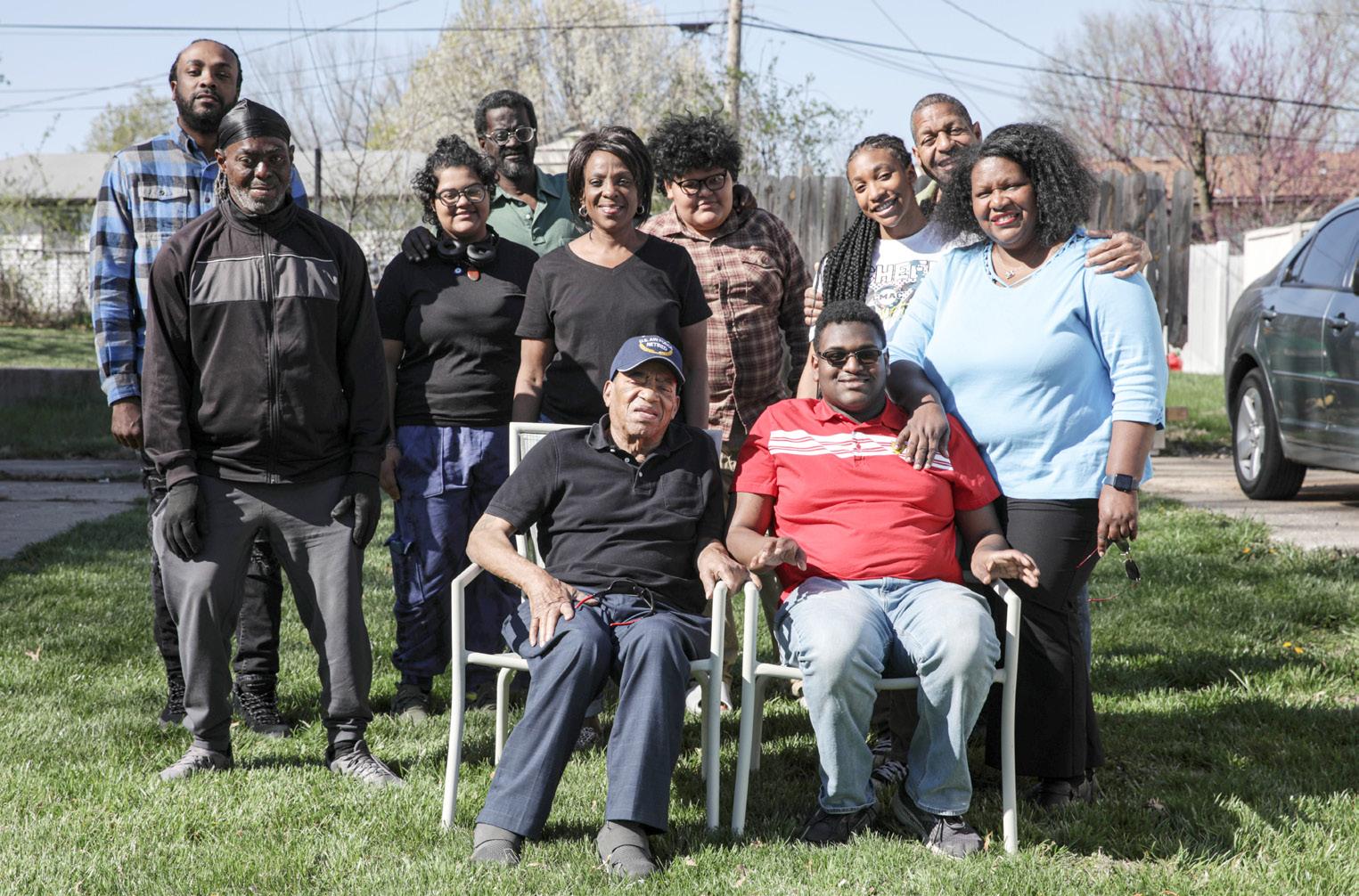
For the Rev. C.W. Dawson Jr., a professor at Westminster College and Moberly Area Community College, Sarah Belle was someone who truly “believed in Black people.” For Dawson, who didn’t grow up in Columbia, Sarah Belle was welcoming and supportive. “Her heart was dedicated to the advancement of African American folks here,” Dawson says.
In 2012, Sarah Belle was awarded a lifetime achievement award from the Columbia African American Association, which June accepted in her honor.
June says he doesn’t think Sarah Belle would have been able to be as much of a support in her community if Sarah Belle and her family didn’t own the homes on Circus Avenue. For one thing, if she had a landlord, she probably wouldn’t have been able to take people in. For another, the stability of home ownership allowed the family to build community and connections without disruption.

Dawson agrees that Sarah Belle’s ownership of their home on Circus Avenue helped facilitate her activism and ability to support her community. It’s important to remember the systems that prevent Black wealth in Columbia, he says. “There’s a real difference between Black wealth and white wealth,” Dawson says. “These issues of poverty and lack of wealth are major, and what (Sarah Belle) tried to do — and what they did

as a family — was secure as much Black wealth as possible. But the systems are against us.”

That all began in 1961, when Sarah Belle and Alice’s parents purchased the neighboring houses on Circus Avenue. Edgar T. Anderson, known as E.T., and his wife, Beulah, had owned another property in Columbia before buying the Circus Avenue homes. E.T. was a reverend at St. Luke United Methodist Church. June says she believes they purchased the houses on Circus Avenue because urban renewal forced them to sell their previous property.

When they purchased the two houses, they listed their daughters on the property deed. This meant Sarah Belle and Alice owned the pair of houses with their parents. “He put both of their names on both houses so that neither one could sell the property without the other one’s (approval),” says Alice’s daughter, Cynthia Anderson.
As Cynthia, now 59, has gotten older, she has developed a better understanding and appreciation for her grandfather’s motivations for buying the pair of houses in 1961. It was a way for him to look out for his family, even after he was gone. “He didn’t want anyone to become homeless,” she says.
June sees his grandfather’s motivation for purchasing both houses as wanting to keep his family close. “In
June Jackson holds a photo of his mother, Sarah Belle Jackson. Sarah Belle was an activist and advocate for the city’s Black community. For June, homeownership is about more than an investment — it’s about setting an example for his kids.
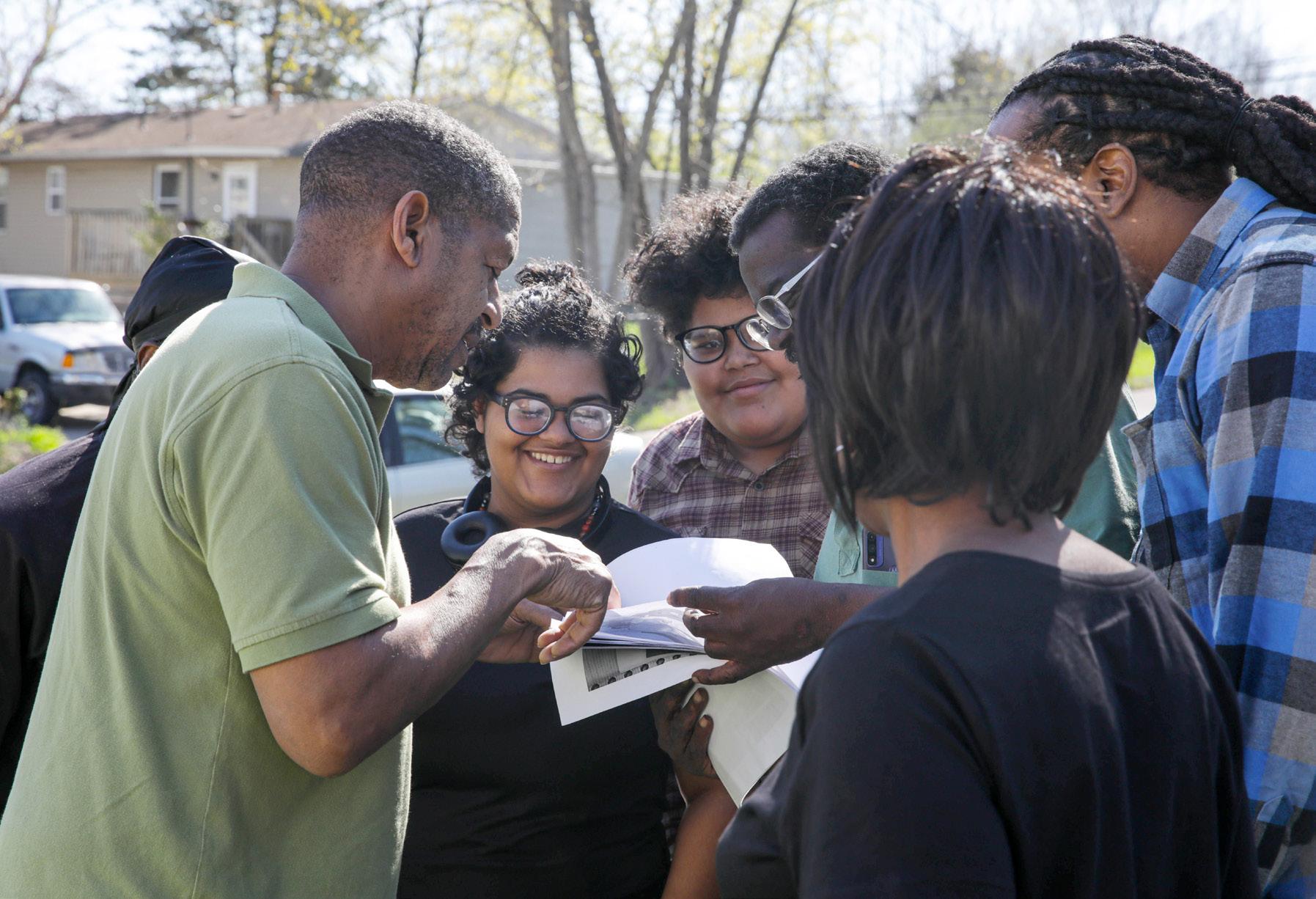

the big scheme of things, as my mom told me, he always wanted the family to be together,” June says.
E.T. and Beulah lived at 411 Circus Ave., and Sarah Belle and her family lived next door. After E.T. and Beulah died, Alice moved her family from Kansas City into 409 Circus. The stability of homeownership created the opportunity for the sisters’ children to build the kind of connections that would cause people to assume they were all siblings instead of cousins.
In the ’70s, Sarah Belle and Alice’s children would travel between houses as
they pleased. Cynthia still remembers how Sarah Belle and her husband would stock their fridge with Alice’s favorite beer, Black Label. Alice would sneak over at night to grab one, not realizing her sister and brother-in-law intended the beer for her.
Alice’s son, Mark, who ran for the city’s First Ward council seat in 2020, got his interest in politics from his aunt Sarah Belle. “(She had) not only influence, but that level of respect,” Mark says.
He says childhood in the two homes on Circus Avenue was filled with great memories along with some more difficult ones. Some of his favorites revolve around Christmas with his mother. “She gave us the same sad song every year: ‘I ain’t got no money, I ain’t gonna get you nothing,’ ” Mark says. But every Christmas, Alice would wow her three children — Cynthia, Mark and Rodney — with gifts. “This woman — she could hide the Statue of Liberty in the house,” Mark says, laughing. The memories they made around Christmas and other family time all centered on the same home because they were able to have roots there.
When Alice died in 1979, the three kids moved in with Sarah Belle next door. Soon after, June, who had recently graduated from high school, moved into Alice’s former house and began renovating it.
That was the beginning of the third generation living in the two houses.
The Anderson/ Jackson family looks at old family photos held by June Jackson and Mark Anderson. June and Mark, along with Mark’s siblings, Cynthia and Rodney, grew up next door to each other on Circus Avenue.Edgar T. Anderson and his wife, Beulah, purchased neighboring houses on Circus Avenue in 1961, and put daughters Sarah Belle and Alice on the deeds. The houses have remained under family ownership ever since.
When Cynthia’s first son, Byron, was born, Sarah Belle had an addition built onto the house so Cynthia wouldn’t have to move out. Apart from the few years they lived in Texas, Byron grew up on Circus Avenue just like his mother had. Cynthia’s second son, Michael, grew up on Circus Avenue as well.
The houses are part of many family memories. Malinda and Thomas Jackson, two of June’s four children, recall playing with cousins or drinking sodas while their dad worked on the houses. One of Malinda’s favorite memories was when her cousin got a motorized toy car and all of the cousins took turns driving it around. “There was always family coming in and out,” Malinda says. “That house was so busy.”
Until 2009, June shared equal ownership with three cousins of the two houses on Circus Avenue. However, in January 2009, Cynthia, Mark and Rodney sold their shares to June, making him the sole owner.

If his grandparents were still around, June thinks they would have felt proud
about the fact that the houses are still in the family. June and his cousins have done what Sarah Belle taught them to do — not let the houses become a burden instead of an asset. “The number one thing my mom instilled in us was that they didn’t want the houses to just go for nothing — like get behind in taxes — where it would be a disadvantage to us,” June says.
Today, June owns and rents out the houses to college students. “We still own the houses and we’re still there,” he says. “That’s the big picture of it.”
Since moving away from Circus Avenue in the late 1980s, June has bought and sold multiple properties in Columbia. Through it all, he has maintained his 45-year career as a vending technician at PepsiCo. June currently owns seven properties. He rents out four of them, including the two on Circus Avenue. To June, home ownership is about more than an investment. “It’s really important because I think it sets an example for my kids,” he says.
June and his cousin Cynthia are recreating a version of their Circus Avenue childhood — but this time on Kent Drive. June owns three properties on
June Jackson, Sarah Belle’s son, is the current owner of the homes and rents the properties to tenants such as Melissa Rogge (left) and Kaitin Garrett.

Kent Drive, including his own home and the home next door, where Cynthia lives. Although June is the owner of the property, Cynthia pays the mortgage, and the two plan to transfer the deed to Cynthia’s name soon.

Having property in the family has been a benefit to Cynthia because she never had to deal with bad landlords.
“I’ll be talking to someone at work and they’ll be like, ‘My landlord this and that,’” Cynthia says. “I can’t relate to that because my landlord is my cousin.”
Dawson says that although some Black families in Columbia have been able to purchase property, others have not had access to those opportunities. Historically, families of color faced discrimination at nearly every turn of homeownership — from higher inter-
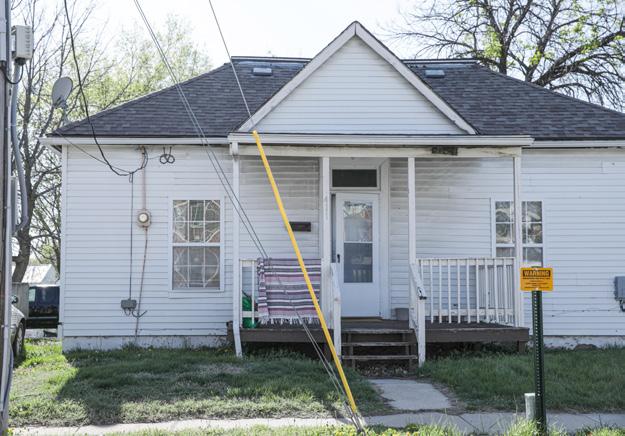
—The Rev. C.W. Dawson Jr.
est rates and lower mortgage approval rates to segregation and red-lining that devalued property values — compared to white families.
Because financial stability is most often accrued generationally, the issues from the mid-20th century are still af-
fecting people today. “Until we find a way in Columbia to address the systems that prevent Black wealth, it’s an exercise in futility,” Dawson says.

All in the family June has heard rumblings that developers
Cynthia Anderson (center) and her brothers Rodney (far left) and Mark (far right) grew up on Circus Avenue, as did her son Byron (second from left). The group is gathered in front of her home on Kent Drive, along with Jeremiah and Hanniah Anderson, two of Mark’s children.

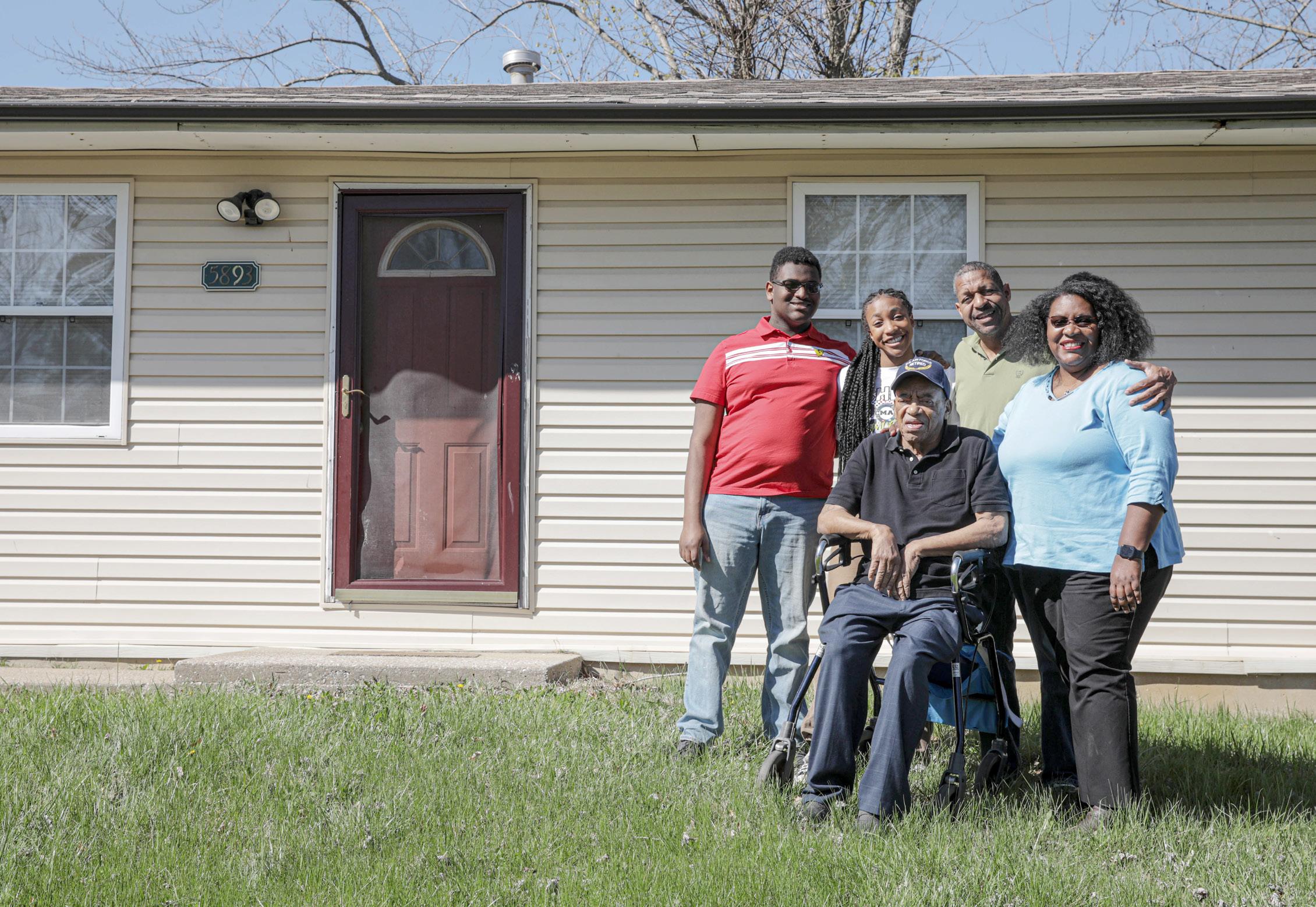
will want to purchase the Circus Avenue houses. He thinks it is possible that, in the near future, the homes could be torn down.
June isn’t quite sure of what he will do if developers come knocking. That decision will depend on his family and their needs.
If he does decide to sell, June says he hopes his family will benefit from the situation. He sees the loss of these homes as a part of the cycle of homeownership in his family and an opportunity to invest more money into other family homes. “I don’t feel bad about that, because they have pretty much served their time,” he says.
June would put the money he makes from selling the houses toward loans, including paying off his and Cynthia’s homes on Kent Drive. Cynthia and June plan to pass down their houses down to their heirs, recreating the tradition their grandparents started on Circus Avenue more than half a century ago.
“And that’s kind of how we’re starting over,” June says.
June Jackson (above, second from the right) stands in front of his home with his two children, Thomas and Malinda Jackson (left), their mother, Kim Matthews (right), and Kim’s dad, Bill Matthews (seated).Homeownership is a way for families to gain financial security, but access to homeownership isn’t equal.
MAE BRUCEEvery city is broken up into different lived experiences. One street with small rental homes owned by absentee landlords is assigned to the elementary school where test scores lag and extra supplies are sparse. Blocks away, another neighborhood with manicured lawns and well-maintained sidewalks is assigned to the elementary school with more experienced teachers and extra resources supplied by an active parent-teacher organization. Only minutes away are sprawling homes on sprawling lots, with access to a private clubhouse and tennis courts, protected from encroachment by strict city zoning codes.
These neighborhoods are separated by a wide range of factors that can help or hinder wealth accumulation: homeownership, racial inequity, political influence, an imbalanced tax system and access to quality education. “It’s this very big, circular problem that kind of feeds upon itself negatively because of so many obstacles,” says Laura Nauser, a former Columbia City Council member.

Jonathan Feingold, a professor in the School of Law at Boston University, says there are two key factors that have been important in the accumulation of wealth for the average American: homeownership and intergenerational wealth transfers. Sometimes, these overlap and intergenerational wealth is transfered
through homeownership.
Not everyone is on equal footing when it comes to access to homeownership. “What we know is that a lot of low-income families struggle with their housing, that the difference between white homeownership and Black homeownership in Columbia is staggering,” says Darin Preis, executive director for Central Missouri Community Action.
There are plenty of factors that lead to this gap, from redlining to real estate associations that excluded people from buying houses in a specific community based on race. “There’s never been a time in U.S. history when homeownership has been equally available to everyone,” Feingold says. “In fact, for most of our history, you had either formal laws or private discrimination that rendered homeownership far less accessible to people of color and communities of color.”
Families who do purchase homes are making bets about the future potential value of the home, with the hope to eventually sell the home for more than it was purchased for. “What I always tell people when they’re not sure whether buying a house is for them, I literally say to them a house is a savings account you can sleep in,” real estate agent Dean Klempke says. “Because you’re just putting your money toward the equity of that house. You are depositing money.” Typically in America, home values trend upward over time, espe-
cially when a family is able to afford updates and repairs. A well-maintained older home typically goes for much more than it was initially sold for, Klempke says.
Families are, in some ways, at the mercy of the neighborhood’s larger trends. “If you live somewhere where all of your neighbors are able to get loans and invest in their homes, it will increase the value of your home,” Feingold says. “But if you live somewhere where your neighbors can’t access capital, and where there’s a disinvestment, then your home might actually lose value.”
A nicer neighborhood with nicer homes can come with additional benefits for wealth accumulation that other neighborhoods don’t have access to. Affluent neighborhoods mean more people are paying more property taxes and can have more pull in the community, which means their needs tend to be heard and addressed better, says Eileen Avery, a sociology professor at MU. In contrast, lower-income neighborhoods don’t have the same sort of economic and social pull. For instance, hiking trails in Columbia are most often in the south and the west, where the higher-income neighborhoods tend to be, Avery says. And that’s just one example. “There are some areas of Columbia that are lower income that are closer to these amenities,” she says. “But most of them are not.”

 ANGELINA EDWARDS
ANGELINA EDWARDS
BEFORE SOPHIA SMITH MOVED TO the Bodie triangle neighborhood, she had a nightmare. She was walking through the area and the houses were painted black. Trash littered the streets. It all felt dark and foreboding. She awoke with anxiety — this nightmare can’t be her new home, she thought. “Lord, please. I don’t want to go to a place like that.”
It was 2015, and Smith, a lifelong Columbia resident, was in search of a home to share with her mother and grandson. They had to move out of their old house because their landlord was selling the property. She’d found a duplex in the north Columbia neighborhood often called the Bodie triangle, which is part of the Auburn Hills division, that was within her budget.
Most of the homes in the Bodie triangle — Greensboro Drive, Bodie Drive and Currituck Lane — are occupied by renters. The rest of the houses in the subdivision are owned by individual homeowners. Although Smith didn’t know much about the area, she had some concerns about crime. But she also felt an overwhelming sense that she had a purpose on Currituck Lane. “That’s what God had in place for me,” Smith says. “I didn’t know that it was not only going to help me, but it was also going to help the neighborhood.”

Smith moved into her new place and soon found that purpose. She served hot meals to some families and neighborhood kids from her front yard and hosted movie nights to bring the residents together. But in 2021, things changed.
A group of investors, including New Page Properties, Southern Properties and ten others, started buying property in the Bodie triangle. The group renovated the homes and raised the rent. Some residents couldn’t afford to stay and had to move, including Smith. Some who remain say the neighborhood now lacks the sense of community Smith was trying to create.
For those who prefer to rent or don’t have the resources to own a home, community and financial stability can be fragile. This is a recurring cycle that plays out in other Columbia neighborhoods and across the U.S. As neighborhoods are renovated and rent rises, those areas become less attainable for people who previously lived there. Communities disperse.
It’s renters who often pay the price of progress.
When Smith first moved to the triangle, she kept her blinds shut because she
didn’t feel comfortable. She’d see kids arguing, even getting rough with each other, as they’d get off the school bus.
But soon she found herself becoming involved in the lives of those neighborhood kids and sometimes mediating conflict between them. She realized the neighborhood was missing something: a sense of community. “When you don’t have anything there for involvement that’s positive,” Smith says, “that’s when all the negative shows up.”
She became one of the north neighborhood leaders working on the Columbia Strategic Plan, where she asked the city to put up basketball goals and solar lights for the kids at the end of Edenton Boulevard.


As a neighborhood leader for the strategic plan, Smith began hosting neighborhood events. The events were a means of gathering the community while allowing Smith to feed some families in the neighborhood. Barbecues, movie nights and holiday events ensued, all hosted at the makeshift basketball court at the dead end of Edenton Boulevard. “The people wanted to come together,” Smith says. “They enjoyed coming together.”
When Smith realized she wouldn’t be able to renew her lease in 2021, she was devastated. Although she hadn’t planned to stay in the triangle forever, she was saddened by the way she had to leave. She remembers the neighborhood kids being upset about her departure. “Miss Sophia, are you going to have to move?” she recalls a few children in the neighborhood asking her one day as she served a meal in her front lawn.
After losing the community she had spent years helping build, Smith knew she wanted to stay involved in activism and service. She shifted her focus to the unhoused community. Now she serves the community numerous ways, from passing out sandwiches and fruit from her car to making hygiene packages with donated products as part of her nonprofit, Sophia’s Helping Hand. She also owns and operates two businesses: Grandma’s Southern Eats, a catering and food product business, and Costless/Payless Productive Cleaning Services, a commercial and residential cleaning business.


But she still misses the community she built in her old neighborhood. About a year ago, Smith returned to Currituck Lane looking for familiar faces. “I was going through there to see if I could do

more activities last year,” Smith says, “and they all have been displaced.”
Susan Horak has lived in Columbia since she was 5 years old. She is the leader of RE/MAX Rental Resources, which manages about 800 properties in the mid-Missouri area. She decided she wanted to get some investors together to buy properties in the Auburn Hills subdivision and improve them. In 2021, they began to acquire as many properties as they could. Horak and her investors now own 35 properties in the neighborhood under various limited liability companies.
When Horak saw the condition of some of the homes, she was horrified: broken appliances, mold, bed bugs, lack of proper flooring and broken windows — attributable, she says, to absentee landlords. “We can do better than this,” she says. Horak says the LLCs spent over $1.5 million in renovations to the properties in addition to acquisition costs. The higher rent helps cover the costs of interest, taxes, acquisition and renovations. “This is not a public property,”
Horak says. “This is a business.”
She questions whether the previously lower rent justified the circumstances in the neighborhood. She says rent had been below market value, resulting in properties that were in “deplorable condition” and safety issues. “What’s really better for the community?” Horak says.
Renters are wondering the same.
Osh Johnson moved into one of the renovated duplexes on Greensboro Drive in 2021. Renovations to her duplex included changing the carpet to hardwood floors, painting the walls gray and replacing the light fixtures. Johnson originally paid $985 a month for her duplex. She was notified that her new rent would be $1,125 a month, which is somewhat representative of other increases in the area.
Johnson, a mother of two who works as a phlebotomist, is unsure of how the increase will affect her. “I’m at a cushion spot right now, but I’m not sure about this whole rising rent thing,” Johnson says. “I don’t really know if I’m going to be struggling or not.”
Some residents say they think the cost of rent influences who moves to the neighborhood. DeAnna Noriega is one of the few homeowners who live in the neighborhood. She and her husband, Curtis Noriega, have owned their house on Bodie Drive for half a dozen years. She says she believes the renovations were an excuse to “jack up the prices” of rent.
“It’s changing the neighborhood to some extent,” DeAnna Noriega says. “We always have a lot of moving in and out because of the rental properties, but it was a much more family-oriented street when we first moved here. There were a lot of children playing in the street. They’ve raised the prices, and they’re pricing families out.”
Curtis Noriega says he has noticed that many of the families moving in are white. He and other residents say the neighborhood used to have a larger presence of Black families.
The Noriegas are one of a minority of families in the Bodie triangle who own their home. It has allowed them to remain and to make friends with neighbors, including one who helps them with household tasks like maintaining
their yard. DeAnna Noriega is blind, and Curtis Noriega uses a wheelchair. DeAnna Noriega says she believes it’s more difficult for people to become first-time homeowners now, even in more affordable neighborhoods.
“It’s not like you can buy a starter house like when we were young,” she says. “You don’t have that liquidity anymore where you can start with a small place and work your way up because even the small places are being priced out of people’s reach.” That inability, she says, “makes the American dream a fallacy.”
Feingold says that homeownership has never been equally available to everyone. “In fact, for most of our history, you had either formal laws or private discrimination that rendered homeownership far less accessible to people of color and communities of color,” he says.
White Americans more easily accrue wealth than any other racial group. In 2022, Black and Hispanic families owned 25 cents and 23 cents respectively for every $1 of white family wealth, according to the St. Louis Federal Reserve. Non-white families are less likely to own their homes, less likely to have a retirement account and less likely to receive an inheritance or gift.
Darwin James, who has lived on Currituck Lane for seven years, says he misses the events hosted by Smith. “I think that brought the neighborhood together for the kids and the adults,” James says. “Everybody can know their neighbors and everybody’s
kids and look out for one another.”
Areas in the neighborhood where kids can safely play and meet each other are also limited. Although the basketball court offers a space for kids in the triangle, they don’t have easy access to nearby Auburn Hills Park, which has a trail, playground, shelter and half basketball court. When kids from the triangle made the trek in the past, Smith says some parents in the Auburn Hills subdivision did not want them playing there.
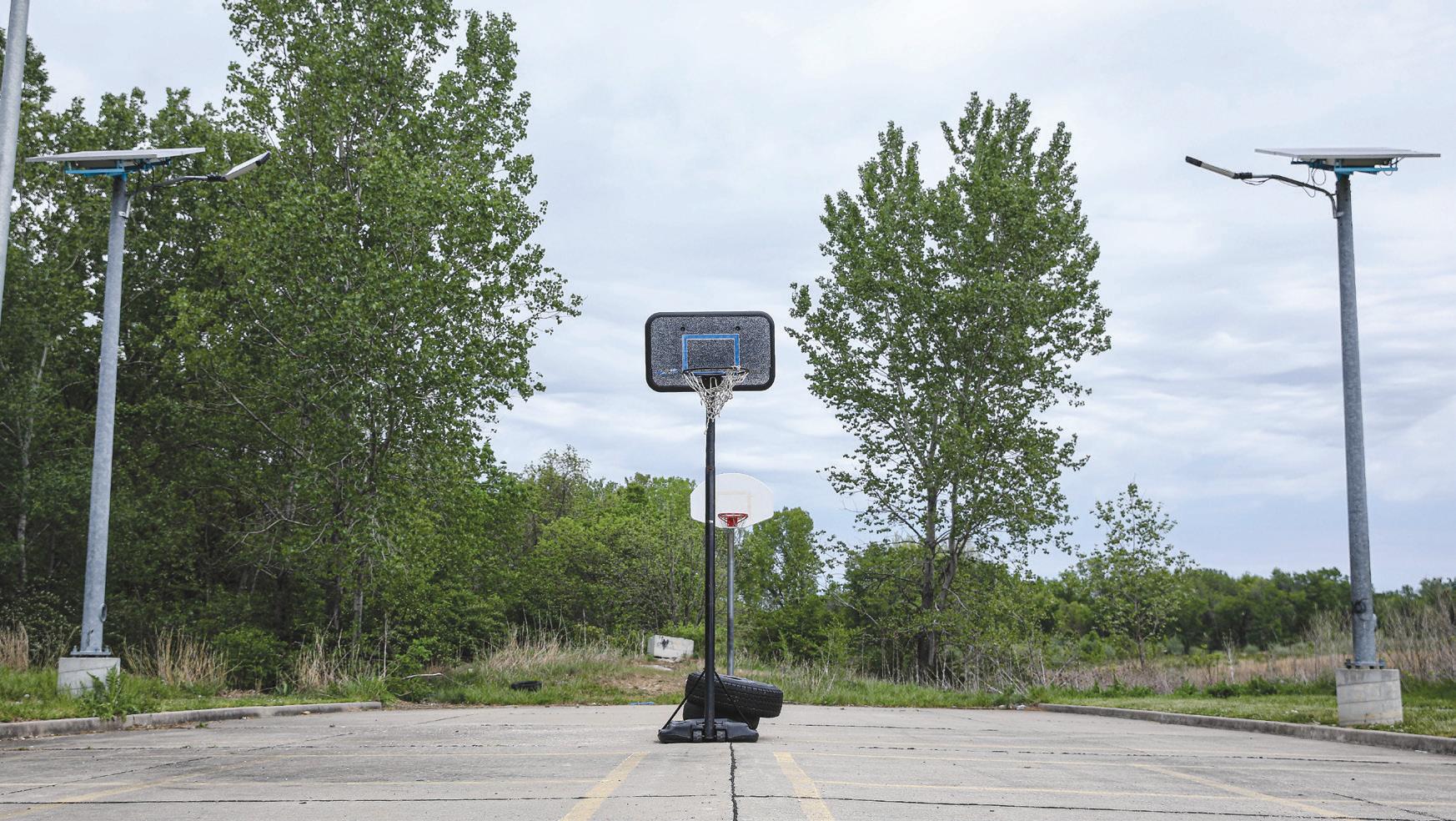
 — DeAnna Noriega
— DeAnna Noriega
Johnson likes that the neighborhood is peaceful and quiet, but she’s hoping to move to Georgia within the next year or two and find a neighborhood with a better sense of community for her kids. “I grew up where everybody on my block knew each other,” Johnson says. “Even when I moved, everybody knew everybody. I’m not getting that here. Especially not with my kids. I just want that community.”
Sophia Smith still dreams. She dreams of buying land for her nonprofit to have a food pantry that supports families and unhoused individuals. An after-school program for kids in north Columbia has also been a goal of Smith’s since she moved to the triangle in 2015. But her biggest personal goal is to become a homeowner. “I’m just trying to make sure I’m still serving,” she says. “The more that we can do and the more people come together trying to support the needs of other people, the better the needs can be met. I can’t do everything, but at least I can do something.”
Hope Davis contributed reporting to this story.
THEY’VE RAISED THE PRICES, AND THEY’RE PRICING FAMILIES OUT.
Perfect your mocktails and say ‘boo’ to booze with these tips from Columbia mixologists.
 BY SOPHIA KOCH
BY SOPHIA KOCH
There are more than 5.5 billion views of the #sober hashtag on TikTok. Scrolling through the videos, you’ll see tons of young adults preaching the benefits of going sober or at least opting for a nonalcoholic drink every once in a while. Luckily, there are far more options out there than plain sodas and juices — mocktails to the rescue.

Opting for a mocktail with ingredients you enjoy can be a refreshing alternative to an alcoholic drink on a long night out, a summer afternoon or when-

ever you feel like it. Alcohol primarily affects the liver but still creates a domino effect on the rest of the body, including the heart, brain and kidneys, says MU medical pharmacology and physiology professor Dr. Shivendra Shukla, who studies alcohol consumption.
Skipping the booze doesn’t mean your drinks need to be boring. But how do you make a perfect mocktail? Two Columbia mixologists explain the building blocks of any marvelous mocktail.
No booze required for these mocktails from Room 38, which are (from left) Apple-Raz Mojito, Mango-Jalapeño Mojito, Bittersweet Martini, Tropical Tea and a Mule.
All about that base
Jared Naley, bar manager at the La Tikita cocktail lounge at The Social Room, says achieving a perfect mocktail should be a fun and creative process that helps you learn what tastes you like.
When making a mocktail, Naley has customers pick a flavor profile to guide the process: fruity, sweet or savory. “The first step in creating a mocktail is starting with whatever flavor profile you want to make,” Naley says.
A mocktail is just like a cocktail in that it’s all about mixing and balancing flavors. Start your perfect concoction with your base flavor profile using teas, syrups or shrubs. You can make your own or find many of these ingredients at specialty grocery stores.
These can act as a replacement for liquor while emulating the experience of an alcoholic cocktail.
“Balance is key,” Giordano says. “If you’re going to do something that has a lot of sugar, you’re going to need some citrus or acid to cut and vice versa.” Keep in mind how your ingredients interact with each other.


Consider club soda, tonic water, ginger beer or any other mixer you enjoy. Depending on your desired final product, you might add bubbles before or after mixing. Add ice and then give the concoction a shake, a blend or a stir. Taste tests are encouraged at this stage.
Once the mocktail is mixed and ready, grab a fancy glass to sip from. Top off your drink with a garnish to give it that final perfect look. Naley’s favorites are

Strawberry Mojito
½ ounce agave syrup
1 ounce lime juice
2 ounces strawberry puree Club soda
Mint
Shake with ice, strain and top with club soda and mint.
Ginger Fizz
2 ounces cranberry juice
1 ounce orange juice
½ ounce lemon juice
¼ ounce lime juice
Ginger beer
Shake with ice and strain into a flute. Add ginger beer. Garnish with a lemon peel.
Bittersweet Martini

½ ounce agave syrup

½ ounce lime juice
2 ounces grapefruit juice
½ ounce raspberry puree Club soda
Shake with ice, strain and top with club soda. Garnish
Tropical Tea
3 ounces tea
2 ounces pineapple juice
1 ounce mango puree
½ ounce lemon juice


Shake with ice and strain. Garnish with lemon.
The MacGruber
2 ounces pineapple juice
1 ounce orange juice

1 ounce lime juice
1 ounce cream of coconut
1 ounce demerara syrup
Shake and strain over ice. Garnish with a pineapple and orange wedges.
Cherry Pie Old Fashioned
1 ounce cherry shrub
2 ounces vanilla- and oakinfused demerara syrup
2 dashes nonalcoholic aromatic bitters




From vegan mac and cheese to turkey tacos, these local kitchens do the meal prep for you.
BY EILEEN LIBusy lives that are full of school, work and other activities can make it difficult for people to gather for family meals. Yet it’s something that remains important across generations, according to a January 2023 Pew Research Center report.
That’s where meal prep businesses can come in. Unlike meal kits, these businesses do the cooking for you, and some can be delivered to your front door. These five Columbia businesses dish out local, ready-made meals, so you can take advantage of fresh food without the added cook time.
Bush’s Catering
Christopher Bush started meal prepping for friends while he ran Bush’s Catering out of the kitchen at Chris McD’s. When the pandemic hit and catering services lost business, he built a website to offer prepared individual meals.
At Koda’s Fit Kitchen (top), the chicken fajita bowls are a favorite, as are the blackened salmon and a Thai peanut chicken bowl. Christopher Bush (right) opened a new storefront for Bush’s Catering in spring. His most popular options are a pesto chicken rice bowl and a steak meal.
Bush experiments with foods to ensure meals last five to seven days — not all foods can be preserved well and still taste good. For example, zucchini is delicious when stir-fried, but when microwaved, it becomes soggy and squishy.
Bush’s Catering’s new storefront on Walnut Street makes getting your meals all the more convenient. Your choice of protein and side dishes can be made in front of you, or you can pick up an online order. Meals ordered before noon on Mondays are delivered on Tuesdays.
“Nobody got famous for making it complicated,” Bush says. “We just do the simple well, and people come back.”
1200 E. Walnut St., 11 a.m. to 6 p.m. Tues.-Fri., 11 a.m. to 4 p.m. Saturday, bushscateringmealprep. com, $52.50–$72.50 for five meals
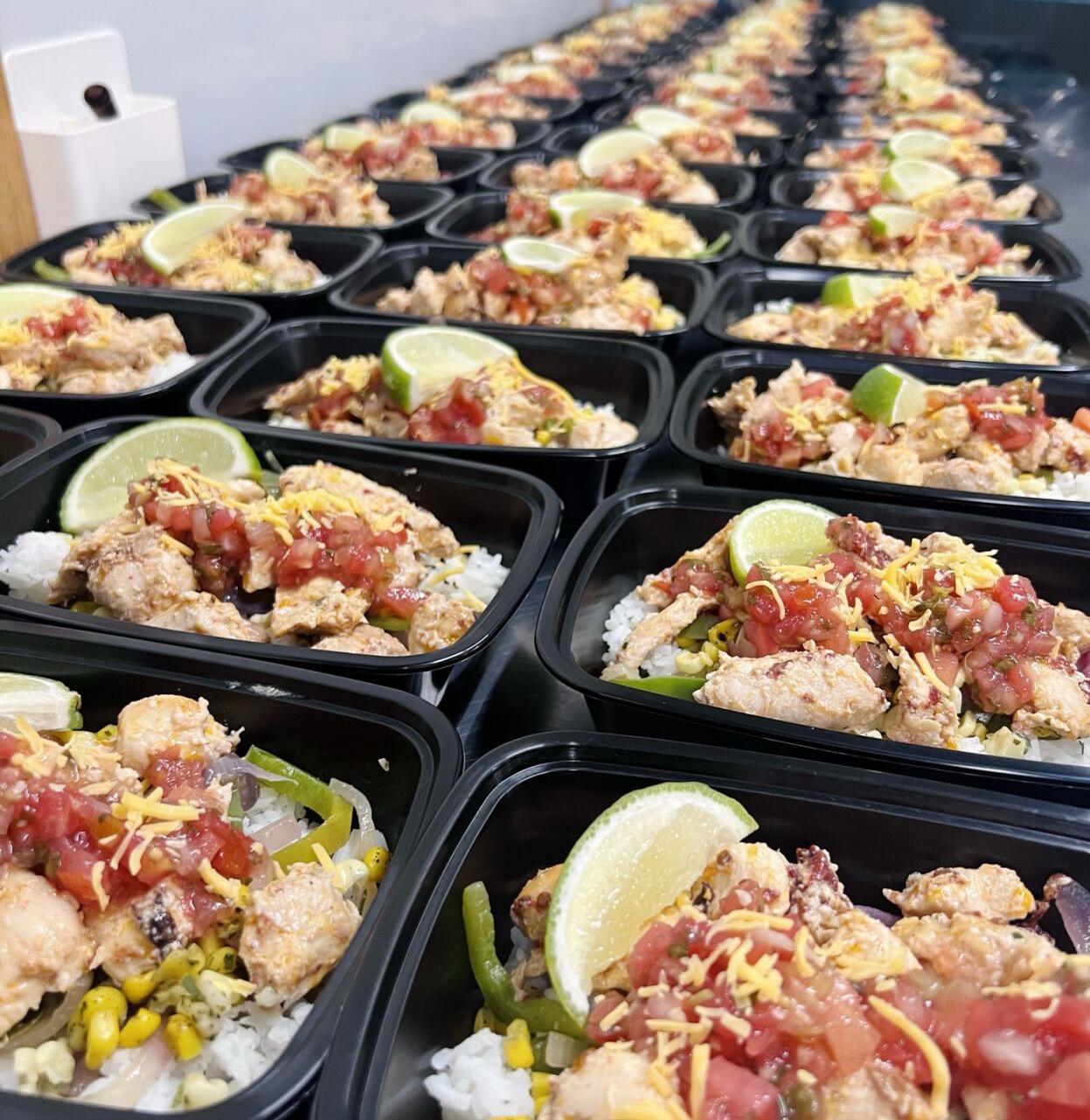
Koda’s Fit
Coming from a family of chefs, certified nutritionist Dakota Owens says healthy
food can also be delicious. With the help of another chef Marcus Lights, Owens aims to provide balanced meals for those without the time or know-how. “There’s no grocery shopping, there’s no waste, there’s no cooking, there’s no mess,” Owens says. “And everything comes in containers that are microwave and oven safe.”
The staple menu includes six permanent entrees available every week. Every two weeks, three to four new entrees are introduced while popular dishes occasionally rotate. Koda’s Fit Kitchen is also working on developing family-style prepped meals that can feed a family of four to five, with options for families with dietary restrictions.
Customers can order online, and orders placed before noon on Fridays will be delivered the following Monday. The food is always prepared the day before delivery. Discounts are available for students, veterans and teachers.
880-4448, kodasfitkitchen.com, meals start around $9.99
Natalie and Jon Hardin recognized the potential for meal prep in Columbia in 2019 when similar businesses were few and far between. They opened a franchise of the St. Joseph-based Lean Kitchen in 2020.
The Hardins choose recipes from the corporate menu based on the seasons and what their customers have loved in the past. Meals are labeled for dietary restrictions such as gluten free, dairy free or low carb. “Based upon what your goals are, we can then determine which of our meals would fit your lifestyle,” Natalie Hardin says.
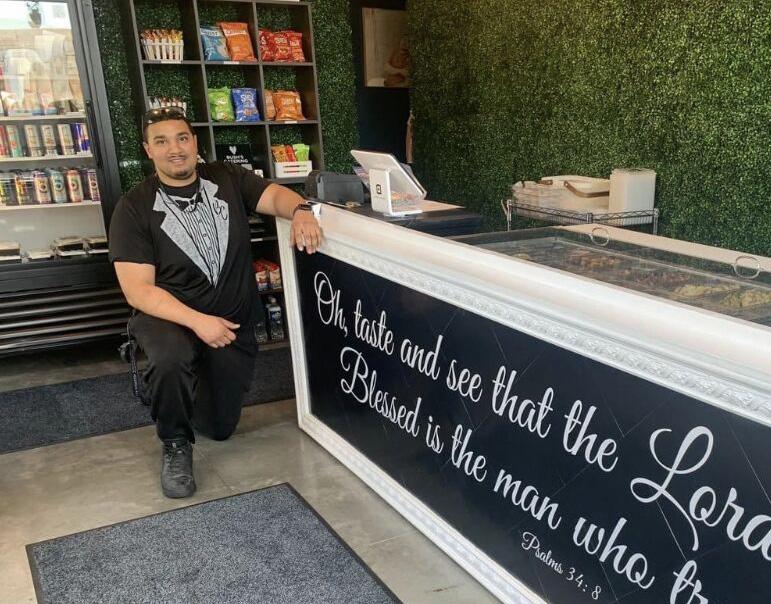
You can visit the store or use its website, where customers can choose their meal, place an order before 10 p.m. on Fridays and receive their prepared food on Mondays, which can be delivered to their address or picked up in store.

212 Green Meadows Road, 10 a.m. to 7 p.m. Mon.-Thurs., 10 a.m. to 4 p.m. Fri.-Sat., 12-5 p.m. Sunday, 777-3636, leankitchenco.com/columbia, $5.95–$11.50 per meal
Main Squeeze
Columbia’s plant-based staple Main Squeeze was remodeled in 2021 to a graband-go structure after labor shortages made it the right time for owner Leigh Lockhart to step away from her traditional restaurant model after 25 years.
Some Main Squeeze favorites, such as the vegan mac and cheese, are still available togo, along with pre-made breakfast burritos, salads and bowls stored in the freezer and refrigerator.
Dishes are made based on what’s in season, as many of the ingredients are sourced from local farms and Lockhart’s own garden. During the warmer months when people tend to prefer lighter options, Main Squeeze offers salads, while in the winter, heavier soups are on the menu. Lockhart cooks dishes that she enjoys. “I don’t want to cook something that I don’t want to eat,” Lockhart says. “So I cook the things that I enjoy, thinking, ‘Well, if I like it, maybe they will like it, too.’”
28 S. Ninth St., 9 a.m. to 6 p.m. Wed.-Sun., 817-5615, mainsqueeze.com, meals start around $7
Both frozen and hot dishes are available at Pasta La Fata. The menu stays consistent from week to week, with lasagna, ravioli, cannelloni and different pasta sauces that can be baked or boiled to enjoy at home.
Ingredients come from over 30 local farms, which owner Michelle La Fata says ensures the quality and freshness of the food and creates a connection among people, food, farmers and chefs. “We can give (customers) a connection to farmers and the people who are making their food because we’re doing so much of the prep and the production,” La Fata says.
Customers can stop by the store to try hot case items like panzerotti and polenta fritti or take home refrigerator and freezer dishes for later. Online orders can be picked up in store the following day.
1207 Rogers St., 11 a.m. to 7 p.m. Tues.-Fri., 10 a.m. to 3 p.m. Saturday, 554-5466, pastalafata.net, $8-$65

A little birdie told us it’s time to spot some flying friends. You don’t have to wing it, thanks to these expert birdwatching tips.
BY EILEEN LIBirdwatching has only been growing in popularity among all generations as a relaxing hobby, according to BirdWatching Daily. Some people started eyeing birds as a way to re-engage with nature and escape technology, while others discovered the joys of birding through social media, which has benefited from the proliferation of cameras that capture beating wings with ease.


It turns out, seeing birds in your daily routine can have significant mental health benefits. According to research published in 2022 in Scientific Reports, seeing or hearing birds is associated with lasting improvements in mental health, both in healthy individuals and those diagnosed with depression.

Hitchcock aside, birds are everywhere, which makes the hobby easily accessible. Missouri’s state park system has a vast amount of public land available for birdwatching and other wildlife viewing.
“All of these public lands add up to more than 1,200 public access sites around the state of Missouri,” says Edge Wade, the president of the Missouri Birding Society and a member of the Columbia Audubon Society.
Vox compiled a list of feathered friends to look for and where to find them in your neighborhood.
The purple martins migrate from central Missouri to Brazil beginning in late August, but martins from as far north
as Canada will cross over the state through October. They’ll return midMarch. “They come up here to build a nest and have babies,” says Mel Toellner, also known as “Bird Man Mel.” Toellner is the founder and co-owner of the bird store Songbird Station in Columbia. The store has provided wild bird supplies, such as bird feeders and birdhouses, for over 27 years.
Purple martins nest in large groups and prefer open areas with at least 15 yards open on all sides and no trees, which means martin houses can resemble apartment buildings. They can be seen in large numbers at Songbird Station’s manufacturing and distribution center in Mexico, Missouri, where there are around 10 houses and hundreds of birds.
Purple martins snack on insects rather than seeds, making them desirable tenants in your yard. There is a common misconception that they eat mosquitoes, when in fact they don’t.
These birdies are known for their beautiful song and the ruby-red “V” on the breasts of the black-and-white males, which makes them easy to identify.
In Missouri, they’re common from May to September, though the spring arrival of rose-breasted grosbeaks this year was slow due to this season’s colder weather. They can be seen in parks, backyards and along the Katy Trail as long as there are trees and shrubs around. However, they tend to stay in thicker woods during the hot summer months, where they aren’t as visible.
Named for its heavy bill, the grosbeak is exceptional at pecking seeds, particularly safflower seeds and sunflower seeds and kernels. They also love berries, especially native berries such as elderberries and blackberries.
The eastern bluebird is Missouri’s state bird, and it can be found in the southern part of the state year-round. Though some stay in Columbia all year, more arrive and also move north for summer breeding.
One way to attract bluebirds is to put up a bluebird house in an open area and protect it from predators, such as
cats and raccoons. You’ll also want to follow specifications for bluebird nest boxes, which include a 4-by-4-inch floor, a 1-1/2-inch entrance hole and a roof that overhangs to protect from rain and wind. “Different birds prefer different houses,” Toellner says. “The size of the house and the size of the opening are very important.”
Bluebirds typically have at least two nesting cycles in Missouri, so you won’t have to wait long once you put up an AirBirdnB house.
The ruby-throated hummingbird is the only hummingbird species that calls Missouri home.
To attract hummingbirds to your yard, stock feeders with a sugar-water mix, which you can make yourself with four parts water to one part sugar. These tiny birds can be aggressively territorial, so it’s best to spread out your feeders throughout your yard. Be sure to grow native flowering plants as well.
Most will leave by early October, though, to winter in warmer climates. These tiny birds will fly nonstop to Mexico and Costa Rica, often losing up to half of their bodyweight in the flight. Ruby-throated hummingbirds will return to Missouri in April and May, building cup-shaped nests on tree branches.
Although Boomers and Generation X make up the majority of birdwatchers, members of all generations are flocking to the hobby, especially as better cameras and social media make it easy to share encounters.

Before you head out to spot birds, download Enjoying Missouri’s Birds from the Missouri Department of Conservation to learn more about the bird species in the area.
Once you’re got a bird in your sights, you can use Merlin, an app developed by The Cornell Lab of Ornithology, to identify it. The app can even listen in to ID a bird by its call. The app also helps crowd-source data that tracks bird populations and patterns.
When you go birding, you don’t need to tote along much equipment.
Consider a pair of binoculars to help you spot birds from a distance, especially if you plan to hike along trails like the MKT Nature and Fitness Trail. “Once you have a pair of binoculars, you don’t even need all that much equipment for the vast majority of people,” says Bill Mees, a member of the Columbia Audubon Society.
Although enjoying nature alone can be pleasant, you can also take advantage of local resources and undertake the journey with experienced people.
The Columbia Audubon Society offers an opportunity for bird enthusiasts to come together and learn from each other. The Bird Walk is held on the first Friday of every month and is an excellent way to learn from those who have more knowledge and experience in birding. You’re also welcome to attend certain Audubon meetings. To find out more about these programs, visit the Columbia Audubon Society website.
Toellner encourages more people to add this into their routine because of the benefits and importance of birdwatching.
“You can improve your heart rate, your stress hormones go down. It is just a good thing to do,” he says.
The Missouri Women’s Business Center provides coaching and resources to entrepreneurs from historically marginalized communities.
BY SOPHIA KOCHOver the last several years, there has been a significant increase in women entrepreneurs. As of 2022, women own about 43% of small businesses in Missouri, according to the last year’s U.S. Small Business Administration Small Business Profile report.
Historically, it has been difficult for women entrepreneurs to receive funding, mentorship and support compared to their male counterparts. From 2011 until about 2021, women-led startups received about 2% of venture capital, according to Pitchbook
Despite those challenges, women and women of color started more small businesses than men during the labor shift of the pandemic, according to Forbes Organizations like the Missouri Women’s Business Center are here to help.
MoWBC is dedicated to making sure women have a seat at the table and have the opportunity to start and run a business.
A non-profit organization, MoWBC is a part of Central Missouri Community Action and assists women, minorities and low- to moderate-income entrepre-
neurs by providing accessible resources, programming and business coaching. It carries on the large-scale mission to empower historically marginalized communities as one of 160 women business centers nationwide.
Jayme Dement Prenger, director of MoWBC, says the organization is dedicated to entrepreneurs and their development. She says the coaches at MoWBC support clients every step of the way.
“Being able to have that person to bounce ideas off of and things like that — I think that really is what sets us apart,” Prenger says, “so that whenever someone is trying to start a business, they have somebody to go to.”
One of the classes offered, FastTrac, is a financial literacy program about how to own a business and the financial indicators entrepreneurs need to secure. Other resources include professional development, monthly meetups with networking events and one-on-one coaching sessions.
Krystal Martin, who owns K&K Co., an e-commerce company that sells skin care, candles and home decor, came to
MoWBC looking for help maintaining and growing her business. Martin says starting and running a small business effectively and efficiently is hard when you haven’t done it before.
Ranjana Hans is the owner of Raw Roots Turmeric. Since 2018, the Missouri Women’s Business Center has helped her build her company. Visit her at the farmers market or check out rawrootsturmeric. com.

The MoWBC offers a variety of support services, including:
• Kauffman FastTrac Business Academy, a 12-week class for new and aspiring business owners
• Business coaching
• Funding advice and credit support
• Connection and networking opportunities. Contact the center at 500 E. Walnut St., Suite 103, 818-2980, mowbc.org.
“I was able to get the LaunchU program and get first-hand information on what it takes and what it really means to be a small business owner,” Martin says. LaunchU has now been modified into the FastTrac program.
Without the help from MoWBC, Martin says finding funding and having the capital to keep her business running would still be an issue today.
Ranjana Hans, owner of Raw Roots Turmeric, has also benefited from working with the MoWBC since in 2018. Back then, she had an idea of her business, the product she wanted to sell and a passion for health and wellness. Hans worked with her business coach to set up a booth at the Columbia Farmers Market, which she continues to operate today. “I still work with her,” Hans says about her business coach. “I still go to meet with her.”
MoWBC is doing its part in mid-Missouri to undo the effects of locked access to entrepreneurship for women and other marginalized groups. “We are just so happy and lucky to have something like the Missouri Women’s Business Center to help us achieve,” Martin says, “from small goals to huge goals.”
Krystal Martin sells household goods and skincare products through her company, K&K Co. She learned entrepreneurship skills through programs at the Missouri Women’s Business Center.

Summer Selections
Check out the original works of the exhibit, which includes oil, watercolor and encaustic paintings, as well as etching, mezzotint printing and fabric techniques. By appointment only the week of First Friday, July 3-7. Through July 29, Tues.–Sat. 11 a.m. to 6 p.m., Sager Reeves Gallery, free, sagerreevesgallery.com, 442-4831
Movies in the Park
Grab a blanket and some mosquito spray and head to Cosmo Park for movies under the stars. The July film is Finding Nemo, and in August Minions: Rise of Gru will light up the big inflatable screen near the Nickell Shelter. July 14, 8:45 p.m. and Aug. 11, 8:30 p.m., Cosmo Park, free, como.gov/ parks-and-recreation/special-events
Boone County Fair
Take part in a tradition that’s close to 200 years old with the Boone County Fair, founded in 1835. Each day features regular events like a petting zoo, circus and live music, plus exhibits and animals from 4-H participants. July 18–22, 5-10 p.m., Boone County Fairgrounds, 5212 Oakland Gravel Road, $10 Tues.–Fri., $15 Saturday, free for 6 and younger, theboonecountyfair.com, 474-9435
The Firefly Music Festival continues through July 15. Four events take place in July, including a patriotic tribute and a celebration of composer John Williams. See the Missouri Symphony
website for full details. July 2, 7, 9 and 15, Missouri Theatre or State Historical Society of Missouri, $29-$59, themosy.org/firefly, 875-0600


Fortune Fest IV
Your destiny just might include heading over to Rose Park for the fourth Fortune Fest. The allages event features music from multiple artists as well as various craft vendors. Aug. 12, 3 p.m., Rose Park, $15–25, rosemusichall.com, 874-1944

Meredith Shaw
Missouri native country rocker Meredith Shaw takes over the Pierpont General Store patio. Shaw has played throughout the area including the 2022 festival formerly known as Roots N Blues. Aug. 18, 6–8 p.m., Pierpont General Store, 7650 Missouri 163, free, pierpontstore.com


 PHOTOGRAPHY BY MEGAN SUNDBERG
PHOTOGRAPHY BY MEGAN SUNDBERG





